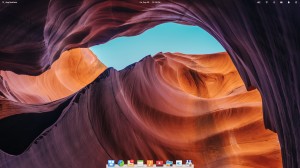
The fast, open, and privacy-respecting replacement for Windows and macOS
Source: The fast, open, and privacy-respecting replacement for Windows and macOS ⋅ elementary OS
Seeing Apple continually fail with its Mac Book Pro line of products finds me repeatedly deliberating a switch away from the Mac platform after some 30 years of having been a staunch Mac user (not a “fan boy”, but strongly supporting the efficacy of the platform in its daily use). Following the passing on of the late Steve Jobs in 2011, for the life of me I can’t see the same drive in innovation as previously in the company’s history. In fact, many important and recent innovations were made and are being made by the likes of Google, Microsoft, even Huawei.
However, as a Mac user I’ve gotten pampered in terms of “screen candy” and nicely shaped objects to look at as well as a fairly orderly, clear interface that is intuitive in its handling and one most anyone usually manages to handle without needing to read up on a bulky chunk of manuals or instructions. You might call this a coherent user experience, which is even more strongly facilitated by the fact that the company always sought to control the interplay of their hardware and software and being adamant about obtaining and keeping utter control of both sides of that coin. And where I’m concerned, no other operating system and user interface paradigm has been able to surpass that coherent and consistent experience although competitors come close by now (e.g. Google’s Android on smartphones as well as their approach of an integrated user experience called Chrome OS with the advent of so-called Chromebooks). However, those approaches still lag in terms of sheer processing and manipulation capabilities the way that the Mac OS and iOS do along with respective devices those operating systems run on).
But now there is a serious contender, as it seems: elementary OS on Linux “powered” devices. However, I shudder at the thought of needing to somehow extract the user data – i.e. pictures, original songs composed, videos, text documents etc. – from the software I created them on and convert all that data into a format that can be used on a different platform and using the apps available there. To give you an idea of the gargantuan effort and starting with the most obvious, easy task of converting documents from word processors: I’d have to open every single document ever created and export its contents to a format that can be used elsewhere, either e.g. simple rich text files – thus losing much of the formatting and embedded pictures – or possibly an office-type format like ODF, presuming the apps on the destination platform support such a format to begin with. (which also means I’d have to run it somewhere prior to the switch and test such a scenario along with other scenarios).
What is more, not only would I have to go back and export files and formats to something generic, I’d have to employ a period of running two platforms in parallel in order to check, which usesage scenarios are being supported and which I have to find workarounds for. Do I really intend to invest all this time into such an endeavour? And am I being 100% certain that I’ll never return to the Mac platform after such a switch? Could I afford to do so given business liasons and other parties I share collaborative efforts with? How about peripherals like e.g. an audio interface that I operate for running a music DAW? What about backing up data and which solutions are in place for a potential new destination platform?
These are but some of the considerations to ponder and the amount of man hours easily goes into the hundreds. However, Apple don’t seem to care much for their personal computing products any longer and their focus seems to rest firmly on the iPhone and iOS devices rather than Macs. And from all we see, it doesn’t appear likely they’ll ever pay more attention to their mobile or even desktop line of products. I rather get a hunch they might retire their entire line of products outside the iOS ecosystem. I have zero indication or “proof” for the latter, it’s purely my intuition speaking. But the golden days of the era of classy and very powerful desktop and mobile devices with the “tasted apple” logo seem to be history from where I’m sitting. (I’m typing this up on a 2012 Mac Book Pro maxed out on memory and internal storage, which I’m really happy with, but refrain from upgrading the OS to any of the latest versions for fear of losing too much performance)



I have been following elementary OS for many years and no doubt, the look and feel is very intriguing. However I also noticed some stability and functionality issues and it’s a rather closed eco system similar to MacOS not allow much flexibility and access to other Linux based software.
So here is what I did: I just installed Ubuntu and added the Pantheon GUI on top of it – that will give you the same GUI using a much more stable popular OS. You can do the same with the Epiphany Browser and other programs if you miss these (however I think Firefox and Evolution are a better choice.
LikeLiked by 1 person
Thanks for this suggestion, Jochen. Sounds good! And yes, I had Ubuntu installed previously when I apparently considered switching for the first time somewhere around 2000, 2001-ish. I terminated that project a short while later as I didn’t really warm to the idea of needing to compile software installations manually using a command line tool (although I was fairly familiar with command lines back then). I try to keep your hints in mind should I actually make the switch. Thanks a bunch!
LikeLike